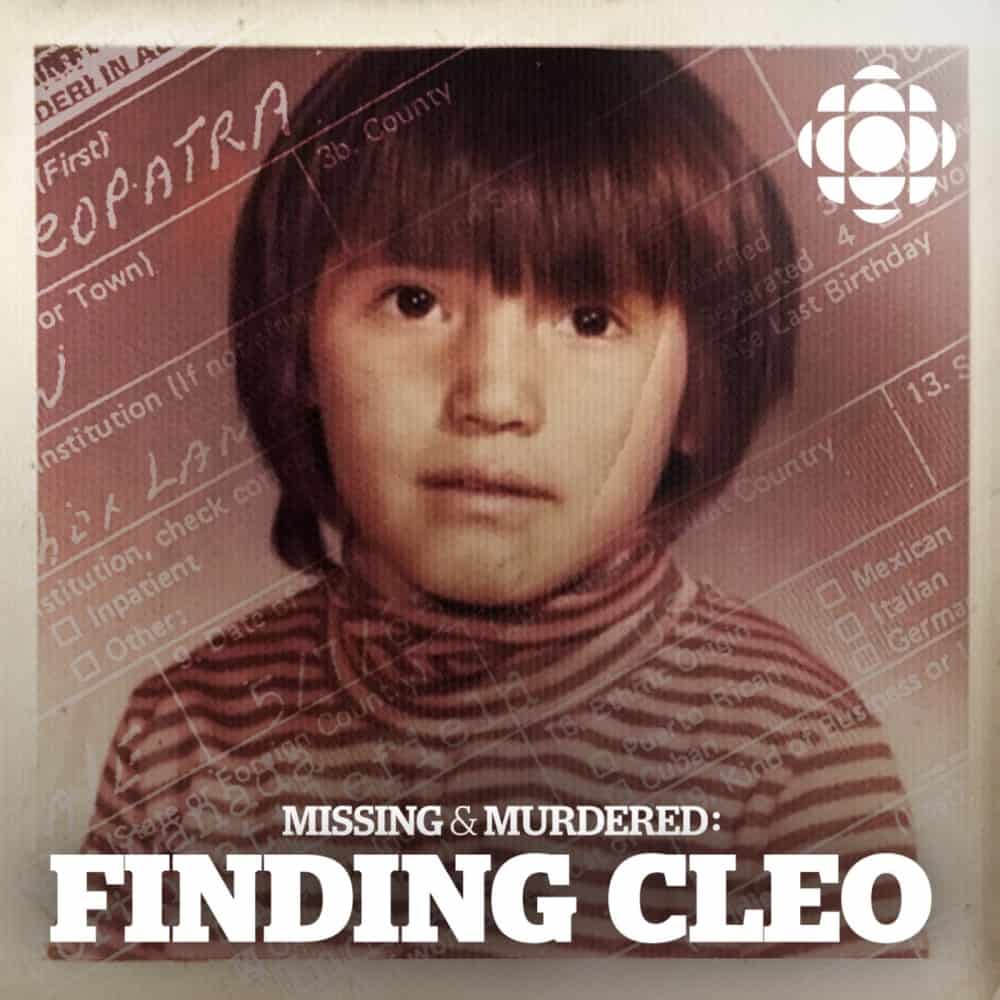TW: Child Abuse, Violence Against Women, Murder
True crime has always been a genre that people are hungry for (the “why” behind that is a subject for a different piece), and CBC’s Missing and Murdered podcast, by award-winning Cree journalist Connie Walker, satiates that hunger—but goes much deeper.
Season 1: Who Killed Alberta Williams? investigates the murder of 24-year-old Alberta Williams, who was found dead alongside the Highway of Tears, near Prince Rupert, B.C. Season 2: Finding Cleo is a hunt to find out what happened to 11-year-old Cleopatra Semaganis Nicotine, who was adopted by a family in Arkansas, as part of our government’s unforgivable Sixties Scoop, and soon after she went missing.
Through detailed investigative reporting, we learn the devastating fate of both Indigenous girls, and a bigger picture of Canada’s monstrous history is revealed in each gripping and gutting episode.
Connie reminds me that the stories of both Alberta and Cleo started long before they were even born. “When I thought about Alberta, it didn’t begin with her murder in 1989, it didn’t even begin even with her birth, it connected back to this bigger story about colonization and racism and policing,” she says.
The podcast traces the difficult years, months and hours that lead up to their disappearance, while carefully sharing parts of Canadian history that were intentionally buried for many decades.“There’s an insatiable appetite right now for true crime and our podcast is focused on these unsolved cases but we’re trying to harness that popularity to tell other stories, to tell the story about certain aspects of Canadian history that we didn’t learn about in school.”
When Connie began working at the CBC as an intern in 2000, Indigenous stories weren’t being shared. “It wasn’t until 2015 that I was working almost exclusively on Indigenous stories. It took 15 years for there even to be an acknowledgement that these were very important stories, and it’s our job as journalists to tell the truth about the realities of how Indigenous people live.”
For many years, Connie’s work focused on reporting for TV and radio. When the popularity of podcasting emerged, she saw an opportunity to tell Indigenous stories differently, and more persuasively, or as Connie shares, “It wasn’t until I started doing the podcast that I realized that I was able to even scratch the surface and get to the root of these stories.”
Podcasting allowed time and space for storytelling that other mediums were less suited to. We all know how fast we comb online news, often giving posts minutes or even seconds of our time. Our attention span is fractured, especially if our gateway to news is through social media. Nuance and depth are lost when stories are built to be click bait. Thankfully, along with the growing hunger for true crime, there has been a revitalized hunger for long-form media in recent years.
“There is this growing audience that is willing to put headphones in their ears and listen to a single story, like Alberta’s or Cleo’s, for over 7 hours,” says Connie. “In some ways I feel like podcasting is the perfect place to tell stories about Indigenous people and communities. It’s intimate and immersive. You’re able to create space for people to have empathy in a way that is difficult in other mediums. But also have the time and space to meaningfully connect the dots back to that bigger history, and back to the concept of when did these stories actually begin.” More time also meant that the lives of both Alberta and Cleopatra could be given space to be honoured. Unlike a name in a headline, soon forgotten, listeners significant time with their stories.
Not only has Missing and Murdered captured mass audiences, but the podcast is being used in schools to teach students about the Sixties Scoop, Canada’s residential school system, our child welfare system that disproportionately negatively impacts Indigenous families, the ongoing crisis of Missing and Murdered Indigenous Women and Girls, and the connection between each issue. “Whenever I hear that educators are using it in their classroom, that’s so hopeful because I didn’t learn this at school and it’s so important that we are telling the kids the truth about what has happened, and what is happening.”
Reclaiming True Crime with Gimlet Media’s Connie Walker is one of the many incredible events slated for the Hot Docs Podcast Festival. Don’t miss listening to her in conversation with award-winning Anishinaabe writer and journalist Tanya Talaga. A columnist with The Globe and Mail, she is the author of the national bestsellers Seven Fallen Feathers and host of the Audible podcast, Seven Truths. Get more info and tickets here.



 Follow Us On Instagram
Follow Us On Instagram
